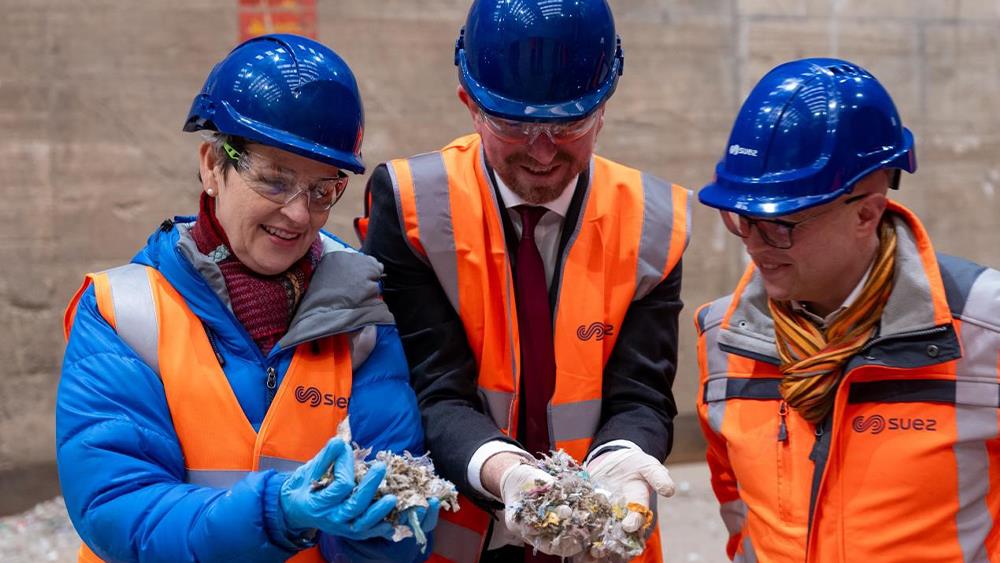

Successful partnership has helped to reduce coal consumption by over 750,000 tonnes at Cemex Rugby plant.
Cemex is celebrating one million tonnes of alternative fuel used at its Rugby Cement Plant, thanks to its partnership with SUEZ recycling and recovery and its industry-leading Malpass farm facility.
The partnership has helped to reduce coal consumption by over 750,000 tonnes at the Rugby plant, in addition to downstream carbon emissions savings from supply chain activities that would previously have been associated with shipping and transporting coal to site.
SUEZ works with Cemex, a leading provider of cement and building materials, to produce an alternative fuel to heat the kiln at its cement plant in Rugby, Warwickshire. As well as using Climafuel® to heat the process at Rugby, the ash that is produced from this is then also incorporated into the clinker produced in the kiln, which is the primary ingredient for the cement making process.
During a visit to mark the milestone, Environment Minister Mary Creagh was shown how the facility uses household, commercial and industrial waste to produce the alternative fuel, called Climafuel®.
SUEZ processes non-recyclable waste at its purpose-built facility in Rugby to produce the sustainable replacement for coal and oil. The facility creates the high-energy fuel from carefully sifted and shredded waste primarily from local authority waste collections, as well as from businesses across the Midlands, which is then used to heat the kiln at the neighbouring Cemex facility for cement production.
Since the facility opened in 2015, one million tonnes of Climafuel® has been provided to Cemex, allowing the building materials provider to supply their customers with more sustainable products including cement, readymix concrete and specialised urbanisation solutions such as mortars, admixtures and pre-cast concrete solutions. These materials are then used for a variety of vital building, construction and infrastructure projects across the UK including new homes, schools and hospitals as well as national road and rail improvements.
Dr Adam Read MBE, Chief External Affairs and Sustainability Officer, said, “The waste and resources industry is at the very heart of tackling the climate crisis. Our sector underpins green transitions across a number of industries, including providing a resource for alternative fuels to allow industries such as the construction industry to become more circular.
“We have been working in partnership with Cemex since 2013 and it’s fantastic to see such a milestone achieved as the UK looks to decarbonise as one of the ways to cut its global emissions. It is a real win-win for both our customer and the environment.”
The use of Climafuel® not only supports the transition away from fossil fuels and provides a reliable source of energy, but also provides customers with a long-term sustainable solution for their waste materials.
Circular Economy Minister Mary Creagh said: “We know far too many of our precious resources are going to waste and that we need bold, innovative approaches to maximise their value.”
“This government is committed to cutting waste and moving to a circular economy so that we keep resources in use for longer, accelerate the path to net zero, and increase investment in critical infrastructure and green jobs.
“Where waste cannot be avoided, it is essential to explore what other benefits it can provide – such as in energy generation. That’s why I was delighted to visit SUEZ’s Malpass Farm facility today as they celebrated their significant milestone, providing a shining example of partnership working in action.”
Phil Baynes-Clarke, Director of Cement Operations for Cemex UK, added: “Our global Future in Action programme underscores our commitment to achieving carbon net zero by 2050. Our partnership with SUEZ has been instrumental in significantly reducing carbon emissions at our Rugby Cement Plant.
“Since 2013, we have collaborated closely with SUEZ to produce Climafuel®, a waste-derived, non-fossil-based alternative fuel used to heat the kiln in the cement-making process. This partnership is a great example of how the cement and waste management industries can work together to deliver circularity solutions that cut carbon emissions and divert waste from landfills.
“Over the past decade, Climafuel® usage has steadily increased at our Rugby Cement Plant. Our ultimate goal is to operate the kiln with 100% alternative fuels, and we are getting close to this target. Through ongoing innovation, we are determined to continue decarbonising our operations and advancing towards our goal of carbon neutrality.”